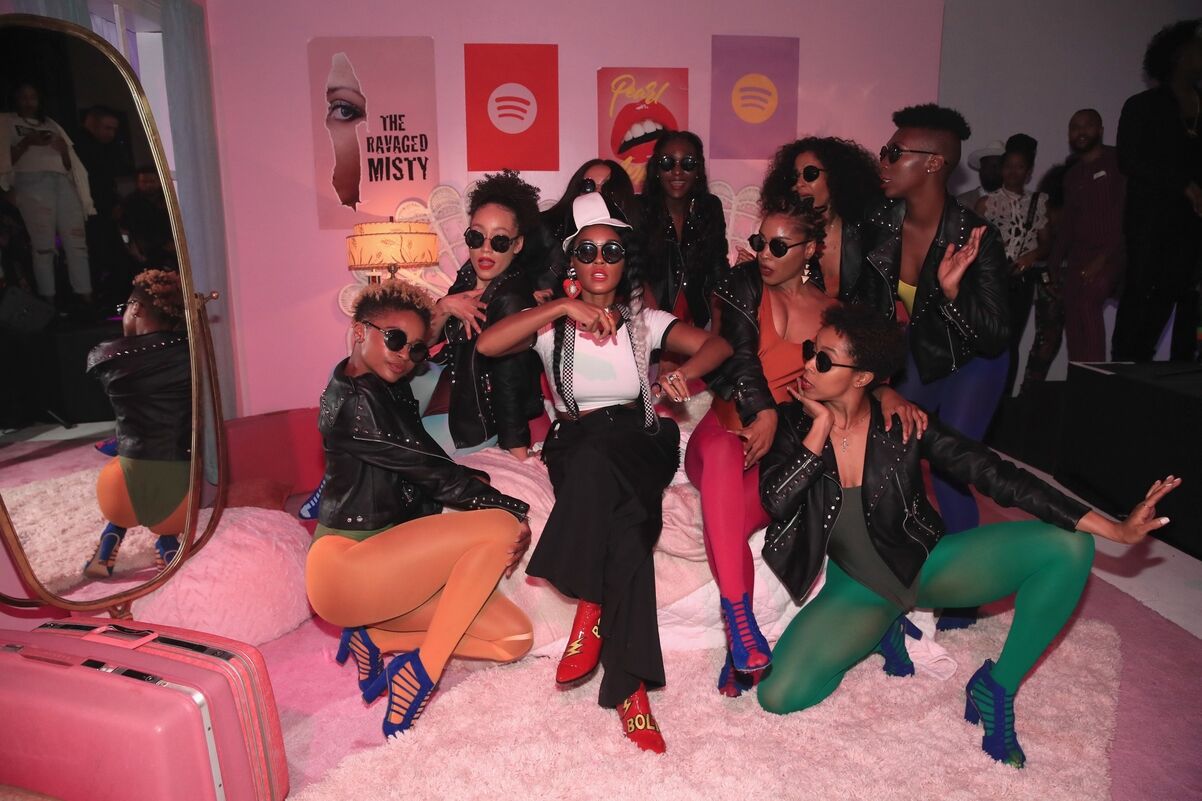Pussy hats have no room in Janelle Monae’s world.
Recording artist and bisexual lighting queen Janelle Monae has undertaken a not-so-quiet mission to reimagine conversations about women’s bodies. While vagina-centric feminism still dominates mainstream (read: white) discourse, her Dirty Computer era, and especially her “PYNK” video challenges that narrative and amplifies black trans and queer realities at the same time.
In a recent interview with People, Monae discussed her single “PYNK,” from her new, extremely black, queer, and feminist album Dirty Computer and said that, while the pink “vulva” pants were a stunning visual image for the song, they are not meant to represent all women.
“Sometimes I think people interpret those as vagina pants, they call them vulva pants, they call them flowers, but it just represents some parts of some women,” Monae told People. “There are some women in the video that do not have on the pants, because I don’t believe that all women need to possess a vagina to be a woman.”
Subscribe to get a twice-weekly dose of queer news, updates, and insights from the INTO team.
in Your Inbox
Even though Monae spelled it out for People, the symbolism was already there in the “PYNK” video. As she said, not every black woman in the video wears the pink vulva pants. And, in at least one shot of the video, one of the women holds a bat between her legs, symbolizing those women who have penises.
Monae is not an innovator when it comes to gender. But, she’s an extremely important amplifier. While “PYNK” celebrates her own black womanhood, it also amplifies the reality of gender that so many black trans women experience and often ask others to realize, as well.
When “PYNK” was first released in April, Monae and video co-star (and rumored girlfriend) Tessa Thompson also shared messages on Twitter explicitly reminding viewers that the video celebrated women, whether they have vaginas or not.
to all the black girls that need a monologue that don’t have Vaginas, I’m listening https://t.co/pyjStgkDKu
— Tessa Thompson (@TessaThompson_x) April 10, 2018
Thank you to the incomparable & brilliant @TessaThompson_x for helping celebrate US (no matter if you have a vagina or not) all around the world ! We see you . We celebrate you . I owe you my left arm T . Xx 👄💞#PYNK💗 https://t.co/cUNgeWk52I
— Janelle Monáe, Cindi (@JanelleMonae) April 11, 2018
In just a few short months, Monae has been able to ignite conversations about bisexuality, queerness, blackness, and women’s bodies. Not to mention, she delivered one of the definitive takedowns of Kanye West’s newfound MAGA-ness.
Monae’s trans inclusivity feels revolutionary not only because media is so often trans exclusive, but because we’re not very far out from the zenity of the pussy hat, a vagina-centric symbol of womanhood often maligned for its white-centric and cis-centric exclusivity.
Monae’s platform is not a self-absorbed one. In her work, the artist is present, but the artist doesn’t dominate. Monae’s visuals make room for, and celebrate, multiplicity. With the Dirty Computer era still rolling out, there’s no shortage of ways that Monae will confront and reshape mainstream notions of black queerness, a necessary fight in a world that continues to demean and denigrate those living both experiences.













